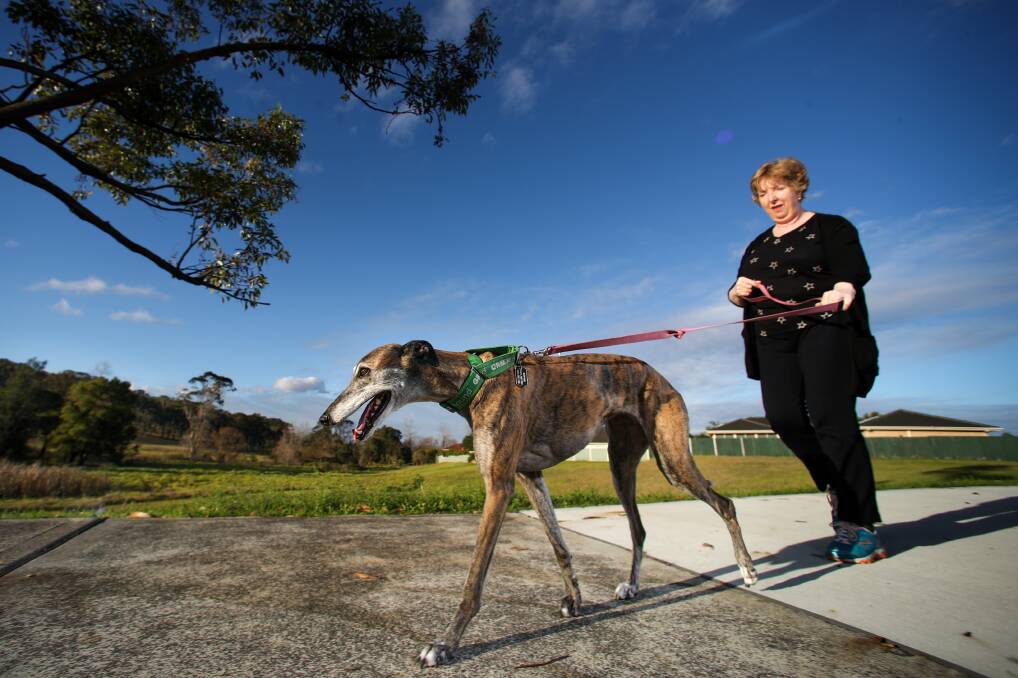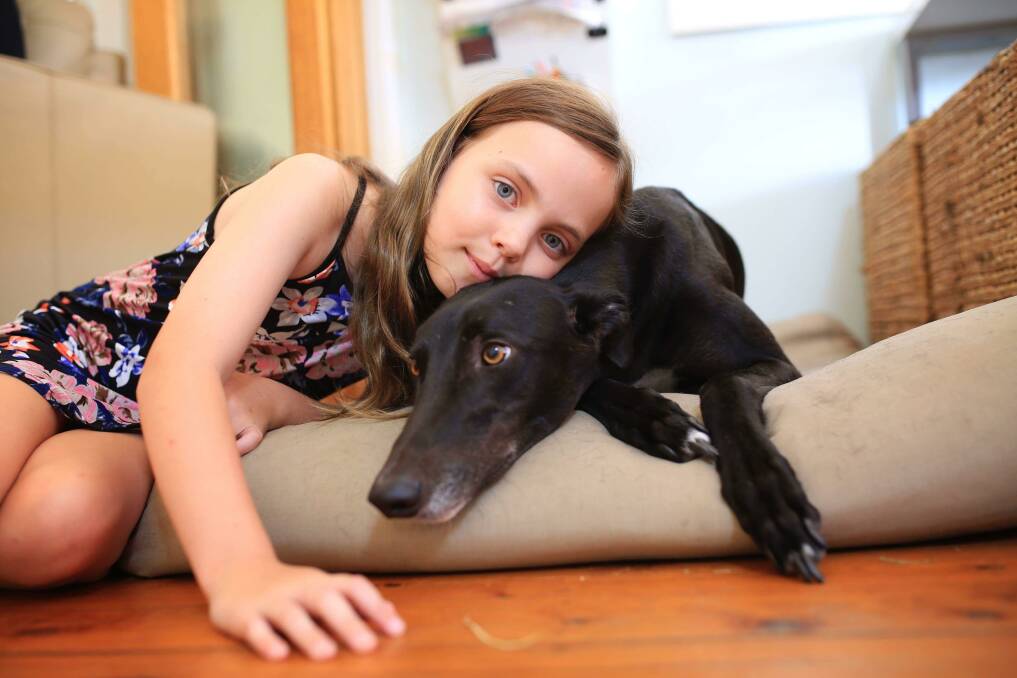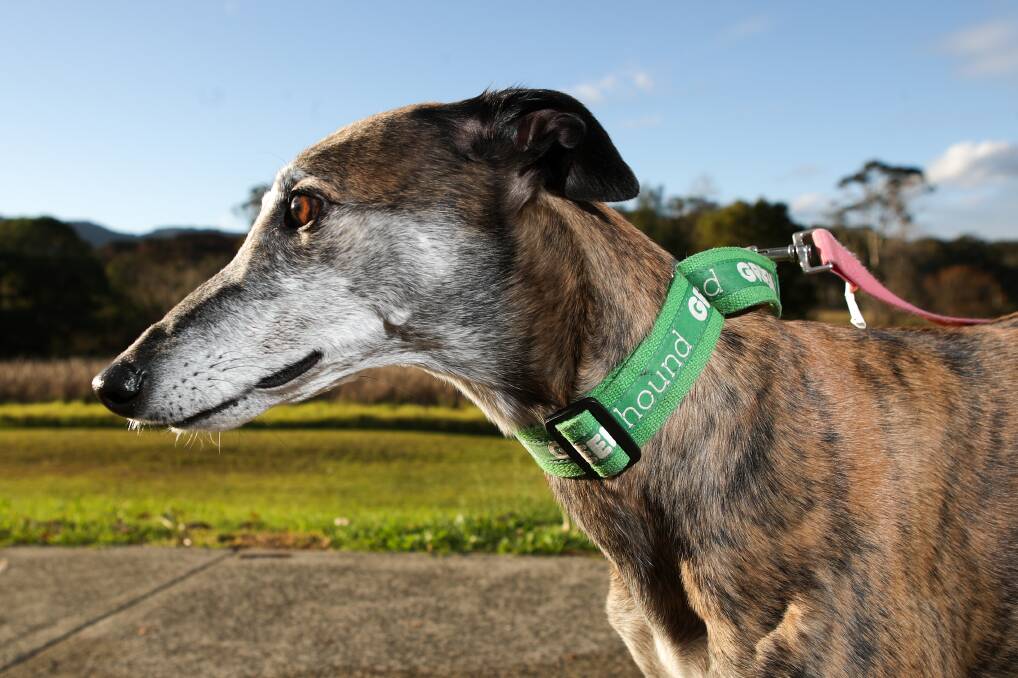
The muzzles are off and greyhounds are "getting the respect they deserve".
Subscribe now for unlimited access.
or signup to continue reading
Illawarra greyhound owners are celebrating the removal of an "archaic" law requiring the animals to wear a muzzle in public, which they say will also help rid the stigma often associated with the breed.
All pet greyhounds in NSW had to be muzzled outside of their homes, unless they'd completed a re-training program and granted an exemption.
As of July 1, that legal requirement no longer applies to greyhounds on the NSW Pet Registry.
The change comes more than two years after the state government vowed to act on a Greyhound Industry Reform Panel recommendation to remove the devices.
'THE RESPECT THE DOGS DESERVE'
Woonona's Susan Wallis has long been frustrated that greyhounds faced more scrutiny than your average animal. Ms Wallis has had her greyhound rescue dog, Ziggy, for two years.
He is her best friend and a companion animal; a beacon of hope that illuminated a dark chapter of her life.
"He came into our life after my mother died and before my daughter died, and has been a carer for me," she said.
Ziggy, 4, was also the perfect example of why the muzzling law was "so unfair", the 48-year-old said.
"He is agoraphobic and claustrophobic as a result of his time in the racing industry, and is one of the most broken dogs that was ever re-homed by the organisation that we got him from," she said.
Ziggy's phobias meant having him assessed for muzzle removal and undergoing the re-training program, called Greenhounds, would have been too traumatic.
Ms Wallis no longer has to worry; the law change means he doesn't need a muzzle when on a leash in public.

"We celebrated by walking the dog in the daylight. I walked my 11-year-old to school with my dog without his muzzle and with great joy," she said.
"We used to walk at night without a muzzle, but you just run the gauntlet really."
Ms Wallis said Ziggy was a hit with the kids on the school run, and the removal of the "archaic" muzzle law had also taken away the "unnecessary" stigma and fear of danger often linked to the breed.
"Kids love dogs in general, but [now] there's no trepidation because the dog's got a cage around its mouth," she said.
"It's unnecessary, they're quite loving animals that bring people to them and now they're getting the respect they deserve."
Gentle giants changing lives
Jacqueline Hurley used to be petrified of dogs; a fear that stemmed from being traumatised by their barking when she was a child.
But the Horsley resident has turned a corner and now embraces the animals; thanks to three adopted gentle giants.
"Greyhounds don't bark, they're not guard dogs. They're quiet, gentle and, even though they're tall, I'm not frightened of them," the 62-year-old said.
It's a tale that goes some way to illustrate the gentle nature of greyhounds.
While they can be aggressive, most of them are not, Ms Hurley said.
"I've had two boys that had to be muzzled. When they're muzzled, they think they're at work, so they're not relaxed at all, they're very alert," she said.
"They also are very vulnerable because ... when a dog is muzzled, if he gets attacked by another dog, he's got no way of defending himself."

Ms Hurley's "little girl", her greyhound Sophie, had already been through the Greenhounds program before the legislation change.
It meant she didn't need to be muzzled in public, provided she wore a green collar - the required ID to show she'd earned the right to be muzzle-free.
The special collar was issued after Sophie had her behaviour assessed and completed a six-week, in-home retraining program at her owner's expense.
WARY APPROACH TO LAW CHANGE
Under the new legislation, greyhounds must still be on a leash at all times while in public, unless they are in a designated off-leash area.
Dogs without green collars need to be muzzled in off-leash areas.
The government said the requirement for muzzles in off-leash areas would be transitional "until the socialisation of ex-racing greyhounds is improved".
It has recommended the owners of ex-racing greyhounds use muzzles for eight weeks after registering them as a pet.
If a greyhound is declared dangerous or menacing, it would no longer be muzzle-exempt.


